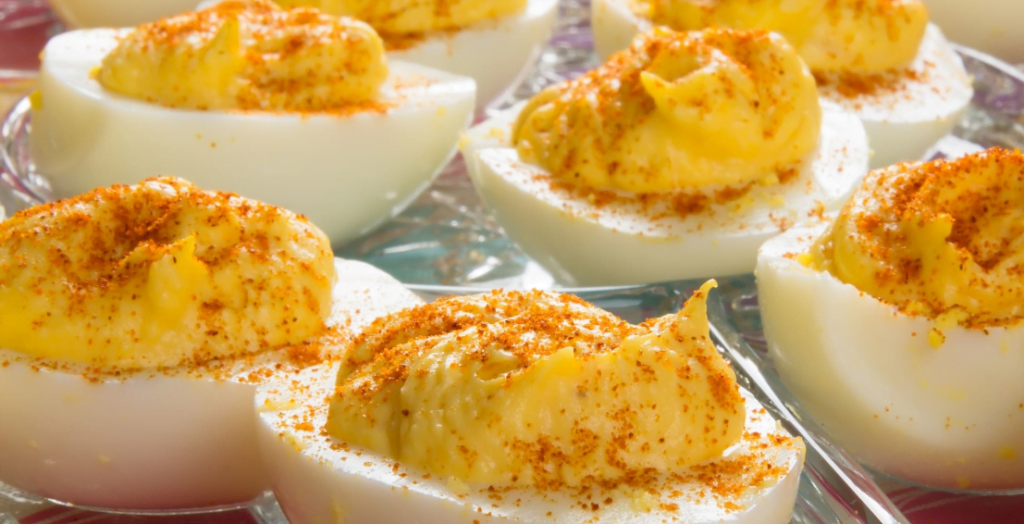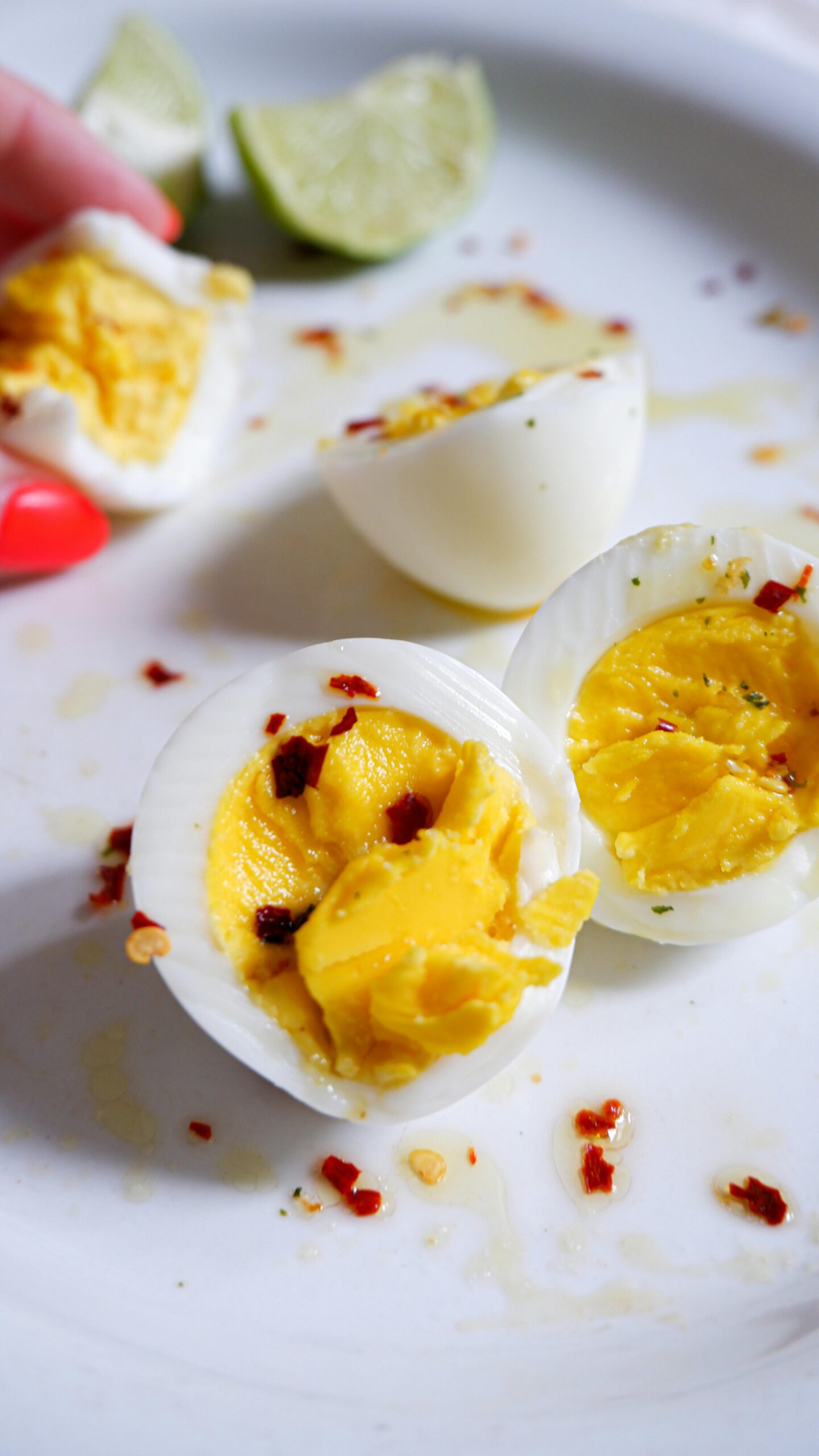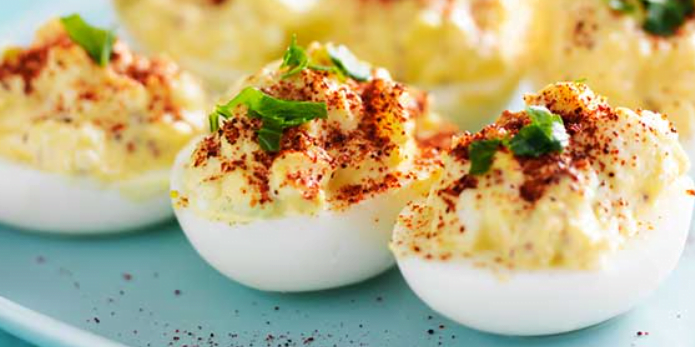Angel Eggs Recipe

Angel eggs, also known as deviled eggs, are a timeless favorite at parties and gatherings. This classic recipe has been passed down through generations, with its creamy yolk mixture and firm egg white providing a delightful contrast of textures. Easy to make and perfect for snacking, angel eggs are a must-have at any social event. With their rich flavor and satisfying crunch, it’s no wonder they’re a crowd-pleaser!
Also Read: Vegetable Soup Recipe Without Tomatoes
Table of Contents
Origins of Angel Eggs
The concept of Angel Eggs emerges as a direct response to the classic deviled eggs, a staple in many households and events. Deviled eggs, which date back to ancient Rome, are named for their spicy or zesty filling. The term “deviled” began in the 18th century, referring to foods that were spicy or highly seasoned. As culinary trends shifted towards healthier eating, the idea of transforming these into a lighter, more wholesome version—Angel Eggs—took flight.

Angel Eggs retain the core elements of the traditional recipe: hard-boiled eggs and a flavorful filling. However, they replace or supplement the rich, calorie-dense ingredients with alternatives that enhance nutritional value without sacrificing taste. This evolution reflects broader trends in contemporary cooking, where the focus is on health, well-being, and sustainability.
The Challenge of Angel Eggs Recipe
The challenge of the angel eggs recipe lies in achieving the perfect balance of flavors and textures, while also presenting a visually appealing dish. The delicate process of boiling and peeling the eggs, followed by the precise mixing of the yolk filling, requires patience and attention to detail. Moreover, the risk of over- or under-seasoning the filling, or over- or under-cooking the eggs, can result in a less-than-desirable taste and texture.
Additionally, the presentation of the angel eggs, including the garnish and arrangement, can make or break the overall appeal of the dish, making it a true culinary challenge to master the art of creating the perfect angel eggs.
Nutritional Benefits of Angel Eggs
Angel Eggs are not only delicious but also come with several nutritional benefits. Eggs themselves are a powerhouse of nutrients, including high-quality protein, vitamins B2, B12, D, and minerals such as zinc, iron, and copper. By altering the filling to include healthier options, Angel Eggs can become a nutrient-dense snack or appetizer.

- Reduced Fat Content: Traditional deviled eggs can be high in unhealthy fats due to mayonnaise. Substituting with ingredients like Greek yogurt or avocado lowers the overall fat content while providing healthier fats.
- Increased Protein: Ingredients like Greek yogurt and cottage cheese are high in protein, making Angel Eggs a more satisfying and muscle-friendly option.
- Lower Calories: Using lighter fillings helps reduce the calorie count of each egg, making it easier to enjoy these treats without overindulging.
- Boosted Fiber: Incorporating vegetables or hummus increases the fiber content, aiding digestion and providing a feeling of fullness.

Angel Eggs Recipe
Description
The Angel Eggs Recipe is a timeless and beloved snack or appetizer that consists of hard-boiled eggs halved and filled with a creamy mixture of yolks, mayonnaise, mustard, and seasonings. With a delicate balance of flavors and textures, this classic recipe is a staple at parties and gatherings, offering a rich and satisfying taste experience. The smooth and velvety yolk mixture, perfectly seasoned with a hint of spice, is nestled in the firm and creamy egg white, making each bite a delight to the senses.
Ingredients
Instructions
- Cut the eggs in half lengthwise and carefully remove the yolks to a bowl.
Mash the yolks with a fork until they’re well broken up. - In a separate bowl, mix together the mayonnaise, mustard, horseradish, salt, and pepper until smooth.
- Add the mayonnaise mixture to the bowl with the yolks and stir until well combined.
- Spoon the yolk mixture evenly into the egg white halves.
- Sprinkle the tops with chives or paprika for a pop of color and flavor.

- Cover and refrigerate for at least 30 minutes to allow the flavors to meld.
- Serve chilled and enjoy!
Notes
- The Angel Eggs Recipe is a relatively high-calorie food due to the mayonnaise content, with an estimated 866-1005 total calories per 6-8 servings. Assuming 6 servings, each serving contains approximately 144-167 calories, while assuming 8 servings, each serving contains approximately 108-125 calories. These estimates may vary depending on specific ingredients and portion sizes used. Moderation is key when consuming this dish, but it’s a delicious and classic recipe perfect for parties and gatherings!
Evolution of the Angel Eggs Recipe
Over the years, the classic angel eggs recipe has undergone many transformations, with various ingredients and flavors being added or substituted to suit different tastes and preferences. Some popular variations include:
- Smoked Salmon and Cream Cheese Angel Eggs: Add smoked salmon, cream cheese, and dill to the yolk mixture for a delicious and elegant twist.
- Spicy Angel Eggs: Add diced jalapeños or hot sauce to the yolk mixture for an extra kick.
- Greek-Style Angel Eggs: Add feta cheese, olives, and sun-dried tomatoes to the yolk mixture for a Mediterranean-inspired flavor.
- Bacon and Chive Angel Eggs: Add crispy bacon and chives to the yolk mixture for a smoky and savory flavor.
Creative Twists and Ideas
- Colorful Garnishes: Use different herbs and spices to create a rainbow of colors and flavors, such as paprika, chives, parsley, and chili powder.
- Flavored Mayonnaise: Use flavored mayonnaise, such as garlic or chipotle, to add an extra layer of flavor to the yolk mixture.
- Pickled Angel Eggs: Soak the eggs in a pickling liquid made with vinegar, sugar, and spices for a tangy and crunchy snack.
- Mini Angel Eggs: Use quail eggs or small chicken eggs to create bite-sized angel eggs perfect for parties and appetizers.
Nutritional Information
Here is a breakdown of the estimated calories per serving for the Angel Eggs Recipe:
Per serving (Assuming 6-8 servings):
- Eggs (6 large): approximately 360-420 calories
- Mayonnaise (1/2 cup): approximately 500-560 calories
- Mustard (1 tablespoon): approximately 5-10 calories
- Horseradish (1 teaspoon): approximately 5-10 calories
- Salt and pepper: negligible calories
- Chives or paprika (garnish): approximately 1-5 calories
Total calories per serving: Approximately 866-1005 calories
Calories per serving (Assuming 6 servings): Approximately 144-167 calories per serving
Calories per serving (Assuming 8 servings): Approximately 108-125 calories per serving
Note: These estimates may vary depending on the specific ingredients and portion sizes used. Additionally, it’s worth noting that angel eggs are a relatively high-calorie food due to the mayonnaise content, so moderation is key!
Frequently Asked Questions (FAQ)
How long do angel eggs keep in the fridge?
Angel eggs can be stored in the fridge for up to 24 hours.
Can I make angel eggs ahead of time?
Yes, you can make the yolk mixture and fill the eggs ahead of time, but it’s best to assemble and garnish just before serving.
How do I prevent the eggs from getting too runny?
Make sure to chill the filled eggs in the fridge for at least 30 minutes to allow the filling to set.
Can I use different seasonings or spices in the yolk mixture?
Yes, feel free to experiment with different seasonings or spices to suit your taste preferences.
How do I ensure the eggs are perfectly boiled?
Place the eggs in a single layer in a saucepan, cover them with cold water, and bring to a boil. Remove from heat and let sit for 12-15 minutes, then rinse with
Can I use Greek yogurt or sour cream instead of mayonnaise?
Yes, you can substitute mayonnaise with Greek yogurt or sour cream for a lighter and tangier flavor.
How do I garnish the angel eggs?
Use chopped chives, paprika, or other herbs and spices to add a pop of color and flavor to the eggs.
Conclusion
The angel eggs recipe has come a long way from its humble beginnings, with countless variations and adaptations emerging over the years. Whether you’re a traditionalist or an adventurous foodie, there’s an angel eggs recipe out there for you. So go ahead, get creative, and indulge in the timeless delight of angel eggs!
